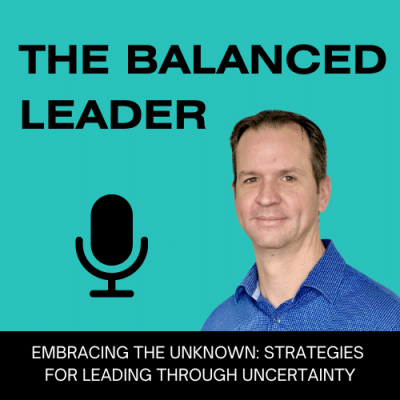In this episode of The Balanced Leader Podcast, I explore the pervasive challenge of uncertainty and its impact on our lives and leadership. I share my personal experiences with anxiety stemming from uncertainty and discuss an intriguing study that reveals how uncertainty can be more stressful than a guaranteed negative outcome. To help listeners understand their own coping mechanisms, I introduce six common archetypes for dealing with uncertainty.
Recognising the potential negative effects of uncertainty on mental health and wellbeing, I offer a range of practical strategies to help navigate uncertain times more effectively. I emphasise that while we cannot eliminate uncertainty, we can build the resilience to thrive despite it. As leaders, when we learn to navigate these uncertain waters, we not only improve our own wellbeing but also set a powerful example for our teams and organisations.
Chapters
00:06 Introduction and Personal Experience with Uncertainty
00:53 The UCL Study on Uncertainty and Anxiety
01:42 Six Archetypes of Coping with Uncertainty
03:28 Negative Effects of Uncertainty on Wellbeing
04:17 Strategies for Navigating Uncertainty
07:33 Conclusion: Thriving Despite Uncertainty

[00:00:00] This is the Balanced Leader Podcast, the podcast that helps leaders elevate their wellbeing and create healthier workplaces. My name is Rob Hills and I’m your leadership and wellbeing coach. Today we’re diving into a topic that affects every single one of us. Uncertainty. This is something I’ve struggled with in my own life and from conversations I’ve had with other people, I know it’s something other people struggle with as well.
[00:00:30] For me, anxiety shows up when I’m uncertain about something, whether it’s about giving a public speech, going to a new situation, or just not knowing how something’s going to turn out. And that all revolves around uncertainty. It’s funny, I was listening to a podcast the other day and it was talking about a study conducted in 2016 at the University College of London.
[00:00:53] The research examined how uncertainty affects people’s anxiety levels. So they took all these participants and they were told they would either receive an electric shock or not. And the likelihood of receiving the shock varied. What the study showed was that the participants who had like 50 percent chance of receiving a shock were significantly more anxious.
[00:01:15] than those who had a higher chance of getting one, like 100 percent chance. So even though they knew they were going to get a shock, they were less anxious than those who only had a 50 50 chance. This study highlights that uncertainty amplifies our anxiety. When the outcome is uncertain, people tend to experience more stress than when they are certain, even if the certain outcome is negative, like in this instance, a guaranteed electric shock.
[00:01:42] Even though we all experience uncertainty to some degree or another, The way we cope with it varies a lot. I’m going to share with you now six of the most common archetypes I’ve come across of how people cope with uncertainty. The first type is the planner. This is a person who has more backup plans than a doomsday prepper has canned beans.
[00:02:03] I am definitely guilty of this. If I’m feeling anxious about uncertainty, my first step is to make a list. Number two is the improviser. This is the jazz musician of uncertainty. Life throws them lemons, they’ll make lemonade. Lemon meringue pie. And they’ll probably figure out how to power a car with lemon juice as well.
[00:02:24] This is definitely not me, and it’s almost the opposite of the planner. Number three is the avoider, also known as the ostrich approach. If you can’t see uncertainty, it can’t see you, right? Wrong. But these folks definitely get points for creativity. Number four is the analyzer. Sounds like something Arnold Schwarzenegger would say.
[00:02:45] The analyzer. Give, give these folks a spreadsheet and watch them go. They’ll analyze the uncertainty out of uncertainty itself. According to my calculations, there’s a 68. 7 percent chance that I’m overthinking this. This definitely sounds like me. Number five is the collaborator. These are the phone a friend champions.
[00:03:07] Why face uncertainty alone when you can drag all of your contacts into it with you? We’ve all got one of these friends, don’t we? Number six is the paralyzed. Making decisions for these folks is like watching paint dry. In slow motion. Underwater. Should I have cereal or toast? Hmm. Let me think about that for like five hours.
[00:03:28] So, which one of these are you, or which combination are you? I would generally say I’m more analyzer and planner. That’s, that’s me, that’s my jam. But, all jokes aside, uncertainty can absolutely be detrimental to our mental health and well being. Uncertainty can lead to increased stress and anxiety, decision paralysis, reduced confidence, Difficulty in planning for the future and impaired communication with the people around you.
[00:03:56] Don’t worry though, it’s not all bad news. There are strategies we can use to navigate uncertainty more effectively. Your solution is going to depend on the archetype that I’ve just told you about. If you are a planner already, doubling down on planning really isn’t your best option. So have a listen to these list of strategies and think about what might be most useful for you.
[00:04:17] The first one is to embrace the unknown. Now this might sound counterintuitive but hear me out. Instead of trying to eliminate uncertainty, which is basically impossible, we need to get comfortable with it. Psychologist Susan David, in her book Emotional Agility, talks about this concept. The ability to be flexible with our thoughts and feelings.
[00:04:37] This includes accepting uncertainty as part of life and as a part of our leadership. Try this. Next time you’re faced with an uncertain situation, instead of immediately trying to jump in to solve it, take a moment just to acknowledge the uncertainty. Say to yourself, this is uncertain, and that’s okay.
[00:04:57] You might be surprised how this simple act can reduce your stress levels. Number two is focus on what you can control. While we can’t control everything, there’s always something within our sphere of influence. Identify what these things are and focus your energy there. This approach is backed by research in cognitive behavioral therapy, which shows that focusing on the controllable factors can significantly reduce our anxiety.
[00:05:24] The next one is to develop scenario planning skills. Scenario planning isn’t about trying to predict the future. It’s about preparing for multiple possible futures. This technique, which was popularized by the Royal Dutch Shell Company in the 1970s, involves creating detailed plans for various potential outcomes.
[00:05:46] So try this. For your next big decision or project, identify three possible scenarios. The best case, the worst case, and then the most likely case. Then, I want you to create an action plan for each. This not only prepares you for different outcomes, but it also helps reduce the fear about the unknown. The next one is to build a support network.
[00:06:09] Remember, you’re not alone in this. Building a strong support network around you can provide you with different perspectives, emotional support, and even practical advice when you’re facing uncertainty. Now, the way you can do this is through peer groups of other leaders, uh, a mentor or coach, whether that’s a formal arrangement or informal trusted team members, or even friends and family outside of the work situation.
[00:06:33] Don’t be afraid to lean on these supports when you’re feeling overwhelmed by uncertainty. And the last one is zoom out. Ask yourself the question, is this really going to be an issue for me in five years time? Oftentimes we get so caught up in the minutiae or the issue that we feel like it’s such a big deal at the time.
[00:06:53] But if we put it in perspective, in five years time, We won’t even remember what all the fuss is about. 99 percent of our daily worries aren’t about the big issues in life. I’m not trying to downplay what’s going on in your life, but I’m just saying some perspective will absolutely help. I hope you found something useful in this list.
[00:07:12] If you have another technique you use that works for you, I’d love to hear it. So please feel free to reach out and share it with me. Uncertainty is an inevitable part of leadership and a part of life. But if we can shift our mindset around it and practice a little bit of mindfulness, we can navigate these uncertain waters more effectively.
[00:07:33] As Jon Kabat Zinn once said, you can’t stop the waves, but you can learn to surf. We can’t necessarily eliminate uncertainty. It’s about building the resilience and the skills to thrive despite it. As leaders, when we learn to do this, we not only improve our own well being, but also set an example for our teams and everyone in our organization.
[00:07:56] So the next time you’re faced with uncertainty, take a deep breath, remember these strategies and embrace the opportunity for growth that uncertainty provides. You got this. I hope you found this episode useful. If you have, I’d love for you to share it with a friend or someone who might be going through their own uncertain times.
[00:08:16] Enjoy the rest of your day and I look forward to speaking with you next time.
